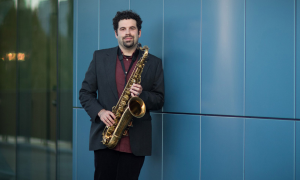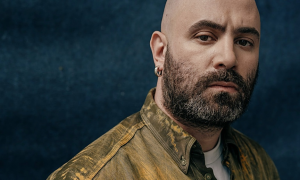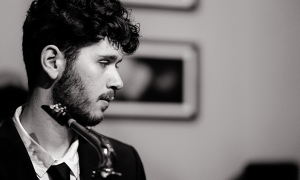Home » Jazz Articles » Take Five With... » Take Five With Lenny Marcus
Take Five With Lenny Marcus
 Lenny Marcus hails from Washington, DC, but studied, performed and recorded for many years in New Orleans, LA, before relocating to Roanoke, VA. He is leader on 18 albums, and has studied and recorded with many jazz legends, including David "Fathead" Newman, Brian Lynch, Sonny Fortune, Frank Foster, Charlie Byrd, Herb Ellis, Alvin Batiste, Ellis Marsalis, Jane Powell and many others. Marcus has played in three New Orleans Jazz & Heritage Festivals, two international festivals in Barbados and Grenada, and his music has been used for many years on the National Weather Channel's Local on the Eights and CNN's Heroes series. His music ranges from modern, contemporary upbeat jazz to a more meditative, contemplative approach.
Lenny Marcus hails from Washington, DC, but studied, performed and recorded for many years in New Orleans, LA, before relocating to Roanoke, VA. He is leader on 18 albums, and has studied and recorded with many jazz legends, including David "Fathead" Newman, Brian Lynch, Sonny Fortune, Frank Foster, Charlie Byrd, Herb Ellis, Alvin Batiste, Ellis Marsalis, Jane Powell and many others. Marcus has played in three New Orleans Jazz & Heritage Festivals, two international festivals in Barbados and Grenada, and his music has been used for many years on the National Weather Channel's Local on the Eights and CNN's Heroes series. His music ranges from modern, contemporary upbeat jazz to a more meditative, contemplative approach.Instrument(s):
Piano, flute, vocals.
Teachers and/or influences?
Teachers: Ray Bryant, Ellis Marsalis, John Phillips, Lester Karr, Alvin Batiste.
Influences: Keith Jarrett, Bill Evans, Dexter Gordon, McCoy Tyner, Oscar Peterson, Herbie Hancock, Mose Allison, and Beethoven.
I knew I wanted to be a musician when...
When I was little, my parents threw house jazz parties almost every Sunday, inviting all the local Washington, DC musicians, as well as many musicians on tour and coming through town. Mom played upright bass, Dad played piano, older sister sang. Ray Bryant, a jazz legendary pianist and my Dad's best friend, was always in the house; playing, showing me a few things on the piano......I was hooked.
Your sound and approach to music:
There are so many great musicians in the world; I just try to add my sound to the mix. I love to compose music for both solo piano and small combos, and lately I've delved into the masterpieces of Beethoven for more composing ideas....there was a lot of "jazz" in his music, from over 200 yrs ago. I love to throw my whole being into whatever I'm doing, and see what comes out.
Practicing listening to me is even more important than playing, but performing and interacting with other musicians in the band where everyone is listening is the best.
Your teaching approach:
I keep teaching fun, showing students how to play a few things right away to draw them in. There's no getting around practicing...a lot, so if you can somehow make practicing a fun, inventive thing to do, students will practice more often and start getting into it more.
Your dream band:
I've already gotten to play and record with some of my dream players, including David "Fathead" Newman, Frank Foster, Brian Lynch, Sonny Fortune....on horns.......and Charlie Byrd, Herb Ellis, and Mundell Lowe on guitars.
My first band had Herman Jackson on drums (brother of Randy Jackson, from American Idol) and Jim Singleton, a great New Orleans' bassist. I would have loved to perform with Dexter Gordon, and today a nice rhythm section would be Jack DeJohnette or Brian Blade on drums, and Christian McBride on bass.
Road story: Your best or worst experience:
Getting to a gig to perform with a large Latin jazz band, and none of the Latin percussionists showed up, they all got lost on the road. So, we had to wing it with a small jazz trio, for a very large audience who expected a much different band. Somehow, we made it through the concert.
Favorite venue:
I would have to say my favorite gig was when my trio got to perform in the Barbados Jazz Festival with Sonny Fortune. We were given a dressing room that was full of fresh seafood and coolers of beer, the stage and setting were absolutely beautiful, the grand piano and acoustics were perfect, and the whole band was put up for an entire week on the island. Wonderful!
Your favorite recording in your discography and why?
That would have to be Jazzaphrenia, since I got to play with stellar sax men Frank Foster and Sonny Fortune, and an awesome rhythm section. It was just a great studio session.
The first Jazz album I bought was:
Ray Bryant, Alone at Montreux.
What do you think is the most important thing you are contributing musically?
I'm trying to be true to the jazz form, while experimenting with my own take on things, such as on our last CD, The Jazz of Beethoven, finding ways to freely improvise in the setting of Beethoven's classical piano sonata forms.
Did you know...
I'm into yoga, meditation, mindfulness, and Tai Chi and Qigong.
CDs you are listening to now:
Radiohead, OK Computer;
Radiohead, Amnesiac;
John Coltrane, A Love Supreme;
Keith Jarrett, Anthology;
Mose Allison, I Love the Life I Live.
Desert Island picks:
Miles Davis, Bitches Brew; McCoy Tyner, Reaching Forth; Keith Jarrett, Belonging; Keith Jarrett, The Koln Concert; Chick Corea, Light as a Feather.
How would you describe the state of jazz today?
Jazz seems to me to always be around, sometimes waning, sometimes really coming to the forefront, but...always there. I think it is just fine.
What are some of the essential requirements to keep jazz alive and growing?
Keep doing new projects, keep composing, working with different musicians, and supporting live music.
What is in the near future?
Thinking about a tribute album, dedicated to my first teacher, my friend, jazz legend Ray Bryant who passed away this past summer.
By Day:
Therapist for war veterans at a VA Hospital.
If I weren't a jazz musician, I would be a:
Writer, short stories and novels, and/or a painter.
Photo Credit
Neil Enriquez
Tags
Lenny Marcus
Take Five With...
United States
David "Fathead" Newman
Brian Lynch
Sonny Fortune
Frank Foster
Charlie Byrd
Herb Ellis
Alvin Batiste
Ellis Marsalis
Ray Bryant
Keith Jarrett
Bill Evans
Dexter Gordon
McCoy Tyner
oscar peterson
Herbie Hancock
Mose Allison
Mundell Lowe
Jack DeJohnette
Brian Blade
Christian McBride
John Coltrane
Miles Davis
Chick Corea
PREVIOUS / NEXT
Support All About Jazz
 All About Jazz has been a pillar of jazz since 1995, championing it as an art form and, more importantly, supporting the musicians who make it. Our enduring commitment has made "AAJ" one of the most culturally important websites of its kind, read by hundreds of thousands of fans, musicians and industry figures every month.
All About Jazz has been a pillar of jazz since 1995, championing it as an art form and, more importantly, supporting the musicians who make it. Our enduring commitment has made "AAJ" one of the most culturally important websites of its kind, read by hundreds of thousands of fans, musicians and industry figures every month.
























